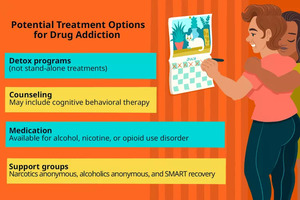How to overcome Drug or Alcohol Addiction
Corps
Drug or Alcohol addiction or substance use disorder (SUD), is when someone continues using a drug or alcohol despite harmful consequences to their daily functioning, relationships, or health. Using drugs or alcohol can change brain structure and functioning, particularly in areas involved in reward, stress, and self-control.1 These changes make it harder for people to stop using even when they really want to.
Drug & Alcohol addiction is dangerous because it becomes all-consuming and disrupts the normal functioning of your brain and body. When a person is addicted, they prioritize using the drugs or alcohol over their wellbeing. This can have severe consequences, including increased tolerance to the substance, withdrawal effects (different for each drug), and social problems.
Recovering from SUD is possible, but it takes time, patience, and empathy. A person may need to try quitting more than once before maintaining any length of sobriety.
This article discusses how drug addiction is treated and offers suggestions for overcoming drug addiction.
Treatment Options
Substance use disorders are treatable. The severity of addiction and drug or drugs being used will play a role in which treatment plan is likely to work the best. Treatment that addresses the specific situation and any co-occurring medical, psychiatric, and social problems is optimal for leading to long-term recovery and preventing relapse.
Detoxification
Drug and alcohol detoxification programs prepare a person for treatment in a safe, controlled environment where withdrawal symptoms (and any physical or mental health complications) can be managed. Detox may occur in a hospital setting or as a first step to the inpatient or outpatient rehabilitation process.
Going through detox is a crucial step in recovery, and it’s these first few weeks that are arguably most critical because they are when the risk of relapse is highest.
Counseling
Counseling gets at the core of why someone began using alcohol or drugs, and what they can do to make lasting changes. This may include cognitive behavioral therapy (CBT), in which the patient learns to recognize problematic thinking, behaviors, and patterns and establish healthier ways of coping. CBT can help someone develop stronger self-control and more effective coping strategies.
Counseling may also involve family members to develop a deeper understanding of substance use disorder and improve overall family functioning.
Cognitive behavioral therapy has been shown effective in helping people overcome addiction. In one study, 60% of people with cocaine use dependence who underwent CBT along with prescription medication provided cocaine-free toxicology screens a year after their treatment.
Medication
Medication can be an effective part of a larger treatment plan for people who have nicotine use disorder, alcohol use disorder, or opioid use disorder. They can be used to help control drug cravings, relieve symptoms of withdrawal, and to help prevent relapses.
Current medications include:
- Nicotine use disorder: A nicotine replacement product (available as patches, gum, lozenges, or nasal spray) or an oral medication, such Wellbutrin (bupropion) and Zyban (varenicline)
- Alcohol use disorder: Campral (acamprosate), Antabuse (disulfiram), and ReVia and Vivitrol (naltrexone).
- Opioid use disorder: Dolophine and Methados (methadone), buprenorphine, ReVia and Vivitrol (naltrexone), and Lucemyra (lofexidine).
Lofexidine was the first medication approved by the Food and Drug Administration (FDA) to treat opioid withdrawals. Compared to a placebo (a pill with no therapeutic value), it significantly reduces symptoms of withdrawal and may cause less of a drop in blood pressure than similar agents.7
Support Groups
Support groups or self-help groups can be part of in-patient programs or available for free use in the community. Well-known support groups include narcotics anonymous (NA), alcoholics anonymous (AA), and SMART Recovery (Self-Management and Recovery Training).
Steps for Overcoming Drug Addiction
Bear in mind that stopping taking drugs is only one part of recovery from addiction. Strategies that help people stay in treatment and follow their recovery plan are essential. Along with medical and mental health treatments, the following are steps you can take to help overcome substance use disorder.
Commit to Change
Committing to change includes stages of precontemplation and contemplation where a person considers changing, cutting down, moderating, or quitting the addictive behavior. Afterward, committing to change can look like working with a professional in identifying specific goals, coming up with a specific plan to create change, following through with that plan, and revising goals as necessary.
Eliminate Triggers
Triggers can be any person, place, or thing that sparks the craving for using. Common triggers include places you’ve done drugs, friends you’ve used with, and anything else that brings up memories of your drug use.
You may not be able to eliminate every trigger, but in the early stages of recovery it’s best to avoid triggers to help prevent cravings and relapse.
Contact NuLifeLineCare Drug & Alcohol Addiction Treatment Centre today to learn more about their treatment program.
Call us on: +91–8958305058
Or visit: https://nulifelinecare.org/
https://maps.app.goo.gl/4RA9z73YBzfXMSyx8?g_st=ic
#drugsfreeindia #saynotodrugs #nashamuktbharat #nashamuktbharatabhiyaan #nmba #bestrehabcentre #rehabilitation #nashamuktikendra #bestrehabindehradun #uttarakhand #fightagainstdrugs #fightagainstaddiction #nomoredrugs #addictionawareness #addictionrecovery #recovery #nasha_ab_nahi #bandkaronasha #dehradun #addiction #bestnashamuktikendra #nulifelinecarerehab














commentaires